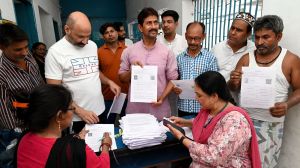Natwar, the Chaudhary of Jatland
What was “urbane”, “cosmopolitan” Natwar Singh doing in a Jat rally in Jaipur? He was testing a political hypothesis: no party, the Congress in this case, can really completely ignore a spolier who discovers identity politics.

This Wednesday, former external affairs minister Natwar Singh reinvented himself as a Jat leader at a huge rally in Jaipur. It was the latest of his responses after his ‘deviancy’ in the ‘oil for food’ scandal – first reported by the Volcker committee and confirmed by the Justice R S Pathak Commission – produced a set of moves by various political actors. I shall look at Natwar’s responses to the verdict by the various players and examine their implications for our democratic polity.
There are three responses that a combatant Natwar made in the thick of the public debate that need attention. The first, his stinging political attack on the PM of his own party under whom he served as minister. During the discussion on the ‘oil for food’ issue in the Rajya Sabha he mocked the PM by saying he merited a place in the Guinness Book of Records for not winning a direct election, even a municipal one, and yet being PM.
Natwar’s second response is equally astounding when he attended dinner meetings with the enemy after the Pathak Committee report — with leaders of the Samajwadi party, the BJP and the Left. At these he accused the Congress of duplicity, graphically stating that ‘not a leaf stirs without the knowledge of the Congress president’.
Natwar’s third response, in getting the Rajasthan Jat Mahasabha to warn the Congress that further ‘humiliation’ would not be tolerated and that insulting Natwar was insulting the Mahasabha meant that cosmopolitan Natwar, the Delhi intellectual, morphed into Natwar the caste leader. He too has obviously read his Machiavelli. Planning like a fox and acting like a lion. Through all this the Congress did not expel him. It isolated, ostracised him, but kept him. Perhaps, being in its inner coterie for years, he knows many party secrets.In the party’s calculus political pragmatism has prevailed over the rules of democratic morality.
Looking at this political event through a democracy lens, three issues need reflection. First, this episode seems like just another example of the erosion of the authority of the party and its capability to discipline its members, particularly in the two big catch all national parties. While the regional warlord parties, such as the Samajwadi party, the RJD, or the AIADMK don’t yet suffer this affliction, since the supremo can punish rebels effectively and thus, in A O Hirschman’s terms of ‘exit, voice, and loyalty’, loyalty is preferred to exit and voice, the national parties do not have this capacity. Natwar’s rebellion illustrates the fact that, to serve one’s interest, voice and exit are options that can now be exercised, more easily, than was possible in the period of Indira Gandhi.
The second issue is that the loosening of party control is indicative of an emerging multi-polarity in the party system. Today the supremacy of a single party, or of few big parties, has been eroded by the growth of a multitude of parties (nearly 750 as per the Election Commission). This requires the big parties to form coalitions at both the union and state levels. A plurality of interests, largely driven by identity politics, has emerged. The ultimatum by the Jat Mahasabha shows that in a plural polity such as India, where the demographic diversity is so extensive, to win electoral majorities parties have to stitch together social as well as political coalitions. Coalitional politics has increasingly given political groups the veto.
This , in turn, gives the politically salient individual, one who exists in the public domain as the pride of the community, excessive ransom powers. By just being a prominent member of the caste in politics is enough for him or her to represent the caste. Presence alone constitutes representation. Such an individual thereby acquires the potential to hold the polity to ransom, to feel unconstrained by rules. This sense of political power leads to an unbridled pursuit of self interest and a transgression of rules. It produces pelf. ‘Oil for food’, ‘fodder scam’, ‘Taj corridor’ and ‘Dadri power project’ all have not just their critics but also their supporters. The deviant acquires a mass following producing thereby a ransom politics. The opposition supports such ransom politics not because it is right but because it places the government in difficulty. Scoring points is more important than democratic morality. The Natwar episode is a pointer to this new phase of politics. His comment in the Rajya Sabha will perhaps go down in the Guinness Book of Records as the first such by an ex-minister against his prime minister.
The author is senior fellow and co-director of the Lokniti Programme of the Centre for the Study of Developing Societies, Delhi.



- 01
- 02
- 03
- 04
- 05




























